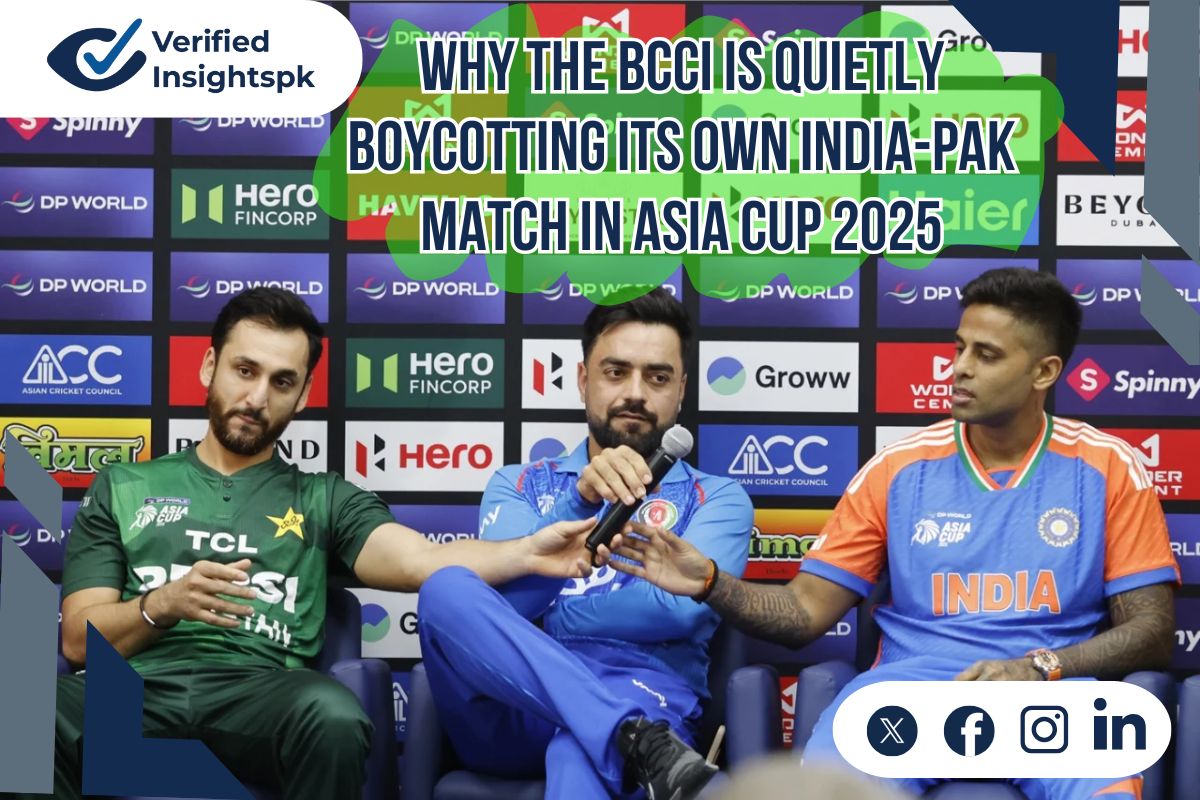
Why the BCCI Is Quietly Boycotting Its Own India-Pak Match in Asia Cup 2025
The cricket world is once again gearing up for an India-Pakistan clash, this time in the Asia Cup 2025. Scheduled at the Dubai International Cricket Stadium, this game should have been the highlight of the tournament. But instead of excitement, controversy dominates the headlines. The reason is clear: the BCCI invisible boycott India Pakistan.
Despite India being the official host of the Asia Cup, senior officials from the Board of Control for Cricket in India (BCCI) have chosen not to attend the match in Dubai. This quiet move is being seen as an “invisible boycott,” a decision that speaks volumes about the current political climate surrounding India-Pakistan ties.
The Backdrop of the BCCI Invisible Boycott India Pakistan
Traditionally, whenever India and Pakistan meet in cricket, it attracts massive attention. From full stadiums to record TV ratings, the clash is often described as the “biggest rivalry in cricket.” However, this year feels very different.
Reports suggest that the BCCI’s decision to distance itself from the India-Pakistan match is linked directly to political pressure and strong public emotions in India. Many fan groups had launched online campaigns asking the board to stay away from the game as a form of protest. The leadership has quietly listened, keeping their distance from the high-profile encounter.
A Silent Stand by the BCCI
According to media reports, no senior office-bearers like Secretary Devajit Saikia or ICC Chairman Jay Shah have travelled to Dubai. Only Rajeev Shukla may attend in his role as an Asian Cricket Council representative, but not as a BCCI official.
This limited presence is unusual. At past matches, especially during major tournaments, the stands often included top BCCI leaders, state officials, and cricket dignitaries. The decision to limit the attendance of 5 BCCI officials at the Asia Cup 2025 highlights the quiet protest being made.
The ‘sBCCI’s invisible boycott of India-Pakistan is not a loud or formal announcement, but rather a symbolic gesture that reflects the mood of the nation.
Fan Pressure and Public Sentiment
The move comes in response to public backlash over India’s Asia Cup match against Pakistan. Social media platforms have been filled with calls for boycotts, trending hashtags, and demands that the BCCI not give legitimacy to the game by showing official presence.
Some groups even pushed for stronger measures, such as refusing to broadcast the match. While that hasn’t happened, the absence of key officials sends a strong message.
It is clear that in this match, India’s political tension and cricket are once again deeply connected.
A Rivalry Beyond the Field
The India-Pakistan rivalry in politics Asia Cup has always gone beyond the cricket pitch. Often, it mirrors the state of relations between the two countries. When relations are tense, cricket suffers. When there is dialogue, cricket sometimes becomes a bridge.
This year, however, relations remain strained, and the game has become another platform for political signalling.
Impact on the Match Atmosphere “BCCI invisible boycott India Pakistan”
The controversy has also affected attendance. Reports indicate that ticket sales for the Asia Cup India-Pakistan match are lower than in previous years. The excitement that usually surrounds the fixture is missing. Instead, the build-up is overshadowed by talk of protests and politics.
The Asia Cup match’s controversial India-Pakistan narrative is dominating headlines, eclipsing team news and player form.
Sports Diplomacy in Play
Observers describe this as a form of sports diplomacy between India and Pakistan—a way for India to register its stance without cancelling the match entirely. Cricket continues, but official support is dialled back.
The decision also shows how the BCCI balances sporting obligations with political realities. The BCCI responds to boycott calls not by withdrawing the team but by reducing symbolic participation.
What the BCCI Is Saying
While there has been no formal announcement, insiders suggest the board will issue a BCCI statement on playing Pakistan to clarify that the team remains committed to fulfilling its international duties. But at the same time, the absence of senior officials is a strong enough sign to reflect the current public mood.
Middle of the Debate: The Bigger Picture
In the middle of all this, one fact remains: the BCCI’s invisible boycott of India-Pakistan is both a cricketing and political story. It highlights the difficult balance between sports and diplomacy.
For the players, the match is still crucial. India enters as the favourites with a strong team, while Pakistan hopes to turn the odds. Yet the real drama is unfolding off the field, where politics and cricket once again collide.
Looking at the Future
What happens next is uncertain. Will such symbolic actions continue in future tournaments? Could they impact upcoming ICC events where India and Pakistan are set to face each other?
The current controversy raises questions about the role of sports in strained political climates. Cricket fans may hope for the rivalry to remain about the game, but as things stand, the narrative is far larger than cricket.
Conclusion
The BCCI’s invisible boycott India Pakistan during the Asia Cup 2025 marks a unique moment in cricket history. It is not a loud or official protest, but its silence speaks louder than words. With limited attendance, sluggish ticket sales, and political undertones, this India-Pakistan clash will be remembered as much for its off-field context as for the result on the scoreboard.
As cricket and politics continue to intertwine, this match shows how symbolic actions, like “quiet boycotts”, can shape global sporting spectacles. The rivalry remains, but the spectacle feels changed, perhaps permanently.











Ahh.. Great… BCCI will never stop overacting… and then what will happen…
but the sad thing is we lost…